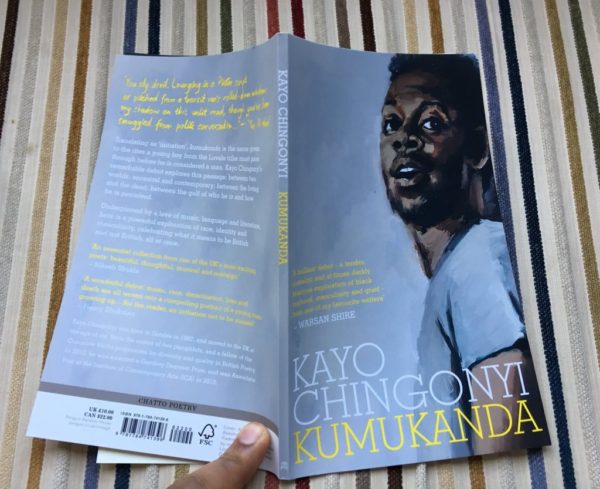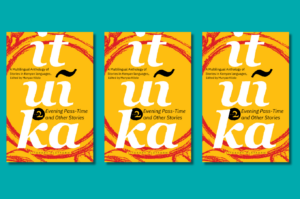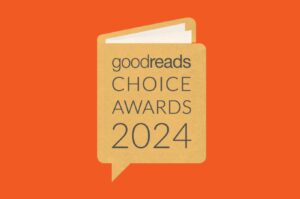
Kayo Chingonyi’s poetry draws from music and deals with masculinity and blackness. The Zambian, who is also a musician, is a notable presence in London poetry circles, with Vice describing him as “the young voice of London life.” His first full-length collection, Kumukanda, was published in June 2017 by Chatto & Windus, and has since been trailed by critical acclaim. The collection, which deals with race, exile, migration, masculinity and hip-hop, was a Financial Times Summer Pick 2017, was included in The Guardian Best Holiday Reads 2017, and was featured on BBC Radio and Radio 6 Music. Tellingly, the book comes with a blurb from Warsan Shire:
“A brilliant debut—a tender, nostalgic and at times darkly hilarious exploration of black boyhood, masculinity and grief—from one of my favourite writers.”
Chingonyi’s Canadian publishers describe him as “a writer of power and precision, as striking on the page as he is on the stage,” and Kumukanda as a promise “to speak about race in the UK as eloquently and with the same urgency and force as Claudia Rankine’s Citizen did in the US.” Chingonyi, writes Vice, “makes use of the scenic clarity that is only available on the 11th floor of tower block council estates in inner-city London, painting images borrowed from your favourite Channel U throwbacks.”

Here is a description from Penguin Random House:
Translating as ‘initiation’, kumukanda is the name given to the rites a young boy from the Luvale tribe must pass through before he is considered a man. The poems of Kayo Chingonyi’s remarkable debut explore this passage: between two worlds, ancestral and contemporary; between the living and the dead; between the gulf of who he is and how he is perceived.
Underpinned by a love of music, language and literature, here is a powerful exploration of race, identity and masculinity, celebrating what it means to be British and not British, all at once.
Kayo Chingonyi’s poem, “The Colour of James Brown’s Scream”—a brief ode to music, complete with references to famed DJs, nightclubs, and dancers, that becomes a nod to losing oneself—was shortlisted for the inaugural Brittle Paper Award for Poetry. He was twice shortlisted for the Brunel International African Poetry Prize, in 2013 and 2017. A fellow of the Complete Works programme for diversity and quality in British Poetry, he is the author of two pamphlets, Some Bright Elegance (Salt, 2012) and The Colour of James Brown’s Scream (Akashic, 2016). In 2012 he represented Zambia at Poetry Parnassus, a festival of world poets staged by The Southbank Centre as part of the London 2012 Festival. He was awarded the Geoffrey Dearmer Prize and has completed residencies with Kingston University, Cove Park, First Story, The Nuffield Council on Bioethics, and Royal Holloway University of London in partnership with Counterpoints Arts. He was Associate Poet at the Institute of Contemporary Arts from Autumn 2015 to Spring 2016. He co-edited issue 62 of Magma Poetry and the Autumn 2016 edition of The Poetry Review.
Kumukanda was most recently reviewed by The Guardian, who hailed its “lyrical elegance” and “unflinching reflections.”
Kumukanda is an authentic and convincing book of poems in its many nuanced portrayals and unflinching reflections; rarely is it content to gloss or deceive.
The collection’s final poems are tender accounts of love and loss, reflecting on orphanhood and grief, but also on the emotional ties that bind us, memories of a mother’s tales of “childhood smiles on granddad’s farm” in “Kung’anda”, the “laughing dance across hot soil // to the ice-cream stand”. As the speaker in one poem recalls a precise intimacy, remembering how there was “only darkness; our bodies speaking”, Kumukanda is an intricate and intense collection, heady with feeling but guided by thoughtful reflection.
For Litro.co.uk, “the beating heart of these poems is music.”
Reading his poetry, identity becomes something spongy, something whose form has not yet solidified as it soaks up and draws us in to this process of growing. In some instances it is something quite soft, layered, impressionable and at times incredibly delicate, like his own slow-blinking performances which can be found on YouTube, the rhythms of which ripple their way this work. But like the music that is so much a part of this collection, these rhythms build, creating an unmistakable, actualising power.
Check out other reviews by Raven Claw Book Club and Culture Fly.
Buy Kumukanda HERE.









COMMENTS -
Reader Interactions